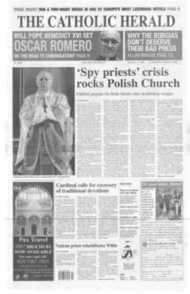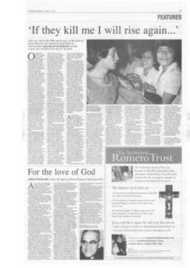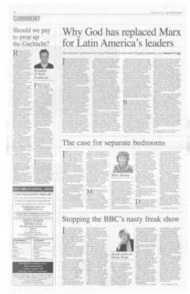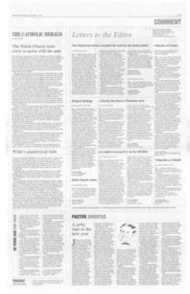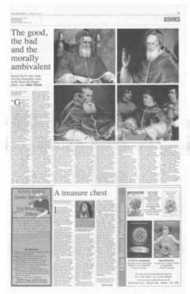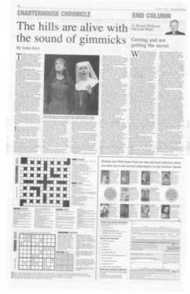Page 5, 12th January 2007
Page 5

Report an error
Noticed an error on this page?If you've noticed an error in this article please click here to report it.
Tags
Share
Related articles
Pope Urges Bush To Help Iraq's Christians
The Pope In His Own Words
Pope Benedict Defends Role Of Wartime Pontiff
Zimbabwean Archbishop Complained To Pope Over 'praise'...
Save Us From The Clichés About Benedict
Benedict XVI, the first green Pontiff
ith so many geo-political problems crying out for attention it must have been difficult for Pope Benedict XVI to know where to begin his traditional survey of international relations this year. But in his address to the 175 diplomats accredited to the Holy See on Monday, he appeared to cover the lot with a surprising amount of detail.
Again, the scandal of world hunger was high on his list of concerns. So, too, were the proliferation of arms, the plight of refugees, conflicts in Africa, Asia and the Middle East, and tension over nuclear weapons (he called on Iran to cooperate with the international community over its suspected weapons programme).
But Benedict XVI also sounded many hopeful notes: growing awareness of human rights, the global push to eliminate poverty, increased interest in Africa, advances in combating drug trafficking in Latin America and recent glimmers of hope in Israeli-Palestinian relations.
In a key sentence, the Pope stressed that world hunger "reminds us of the urgent need to eliminate the structural causes of global economic dysfunction and to correct models of growth that seem incapable of guaranteeing respect for the environment and for integral human development, both now and in the future".
Besides being a bold call for a new economic world order, this appeal shows that Pope Benedict is not afraid to take on certain issues, such as the environment, that are not traditionally at the top of the list of Church concerns.
Although he is yet to use the words "climate change", Benedict XVI is becoming known as the first "green Pontiff". regularly calling for responsible stewardship of the planet.
The Pope's speech was, as expected, one of common sense; a rational balance of idealism, realism and faith.
And he closed with a simple yet powerful sentence: "It is by respecting the human person that peace can be promoted, and it is by building peace that the foundations of an authentic integral humanism are laid."
As one foreign diplomat put it: The Pope has once again shown very good leadership and now it's up to us to follow up on that."
As always, few will. But for those who do take an intereSt, the Holy Father has illuminated the path that needs to be taken to achieve world peace.
Aconflict which is clearly uppermost in the Pope's mind is the one taking place in Darfur, Sudan. Lamenting the slow path to peace in that region, the Pope said on Monday that only "active cooperation between the United Nations, the African Union, the governments and other interested parties— will end the four-year conflict.
The Church, through the Sant'Egidio lay community of Rome, has been seeking a resolution to the conflict for some time.
Two years ago the community managed, through a series of workshops in Rome, to bring the warring sides to peace talks in Abuja, Nigeria. These negotiations eventually failed. Now the Sant'Egidio activists are continuing their efforts by working closely with rebel groups, the African Union, the European Union and the United States State Department.
"The problem is coordinating our efforts and trying to work on the side of the rebel movements," says Vittorio Scelzo, who is leading Sant' Egidio 's peacemaking efforts. "We are now talking to rebel leaders individually, seeing if it is possible to find a common pasition."
The lay community, known as the "UN of Trastevere" for its success in resolving a long-running civil war in Mozambique in the 1990s. stresses that the issues are highly complex and that a resolution of the conflict is unlikely in the near future. Yet, on the positive side, the Pope and Sant'Egidio like to emphasise the Christian interest in resolving a war fought primarily by Muslims.
Although the war is not about religion, it is proving to be a testimony to inter-religious cooperation. "Some extremists related to bin Laden are asserting that the war is part of a strategy of Islam to expand Muslim influence in central Africa," Mr Scelzo explains. "But this is not an issue related to religion, it's a political question related to marginalisation."
blog comments powered by Disqus


